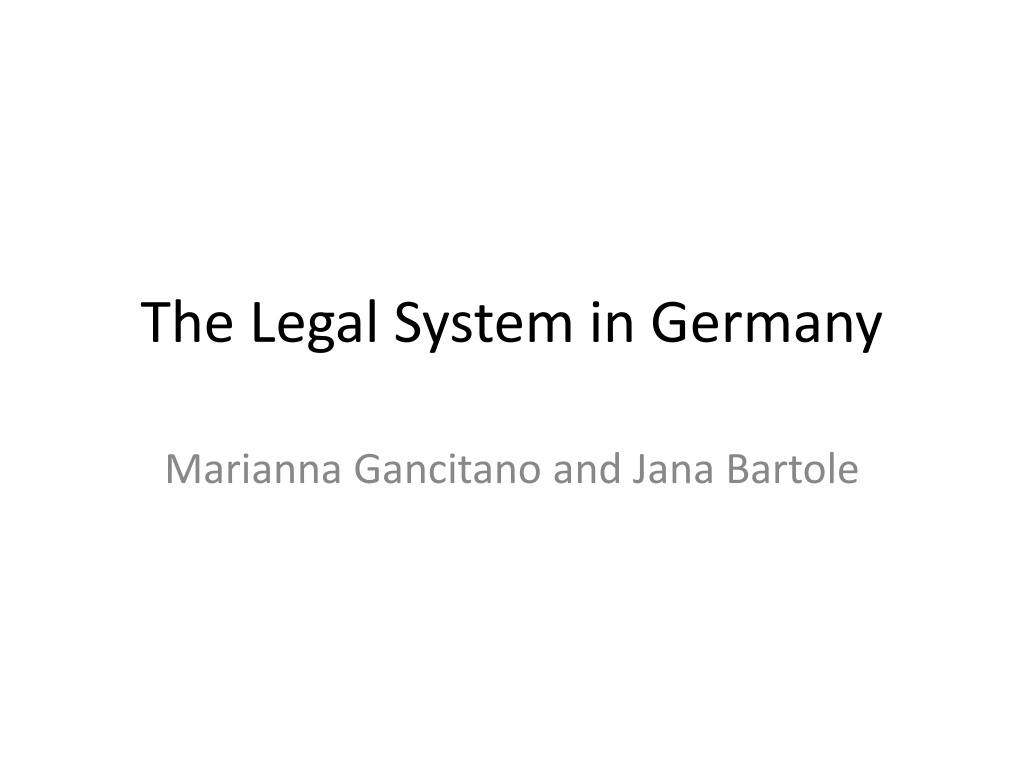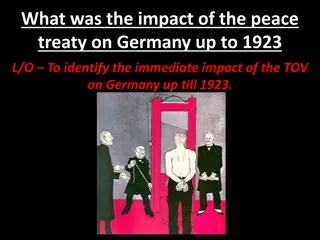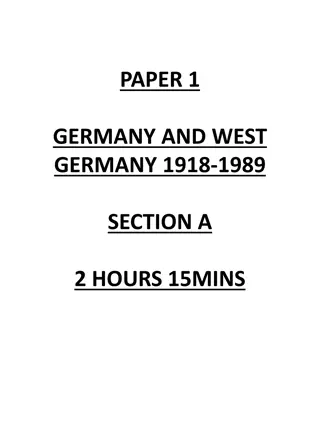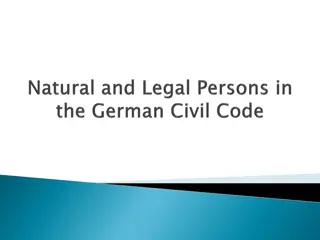The Legal System in Germany
Explore the federal parliamentary republic system in Germany, where legislative power lies with Bundestag and Bundesrat. Learn about the independent judiciary and the division of powers between federal and state levels.
Download Presentation

Please find below an Image/Link to download the presentation.
The content on the website is provided AS IS for your information and personal use only. It may not be sold, licensed, or shared on other websites without obtaining consent from the author. Download presentation by click this link. If you encounter any issues during the download, it is possible that the publisher has removed the file from their server.
E N D
Presentation Transcript
The Legal System in Germany Marianna Gancitano and Jana Bartole
Contents 1. 2. 3. 4. 1. 2. Head of Government 3. Constructive Vote of no confidence Basic Law Judiciary Foreign Relations System Federal State Relation between state and L nder Legislative Bundestag Election of the Bundestag Bundesrat Legislative Process Executive Head of State
System Federal parliamentary republic Legislative power is vested in Bundestag and Bundesrat Multi-party system Judiciary independent of executive and legislature Divided powers between the federal and state levels and between executive, legislative and judiciary
Article 20 [Basic institutional principles; defense of the constitutional order] (1) The Federal Republic of Germany is a democratic and social federal state. (2) All state authority is derived from the people. It shall be exercised by the people through elections and other votes and through specific legislative, executive, and judicial bodies. (3) The legislature shall be bound by the constitutional order, the executive and the judiciary by law and justice. (4) All Germans shall have the right to resist any person seeking to abolish this constitutional order, if no other remedy is available.
Federal State Former Princedom After Second World War 1945 territorial redevelopment After reunion 1989 integration of the 5 new L nder Legislative competences shared Own constitution minimal accordance with the Basic Constitutional Law
Relation between state and Lnder Services of public charges are divided between the levels Every level receive part of the income tax L nder 42.5 %, other incomes by special L ndertaxes State 42.5 %, other incomes by different taxes
Bundestag Was establishes in 1949 More powerful than the Bundesrat Directly elected by the German people 4 year term Personalised propotional representation
Article 38 [Elections] (1) Members of the German Bundestag shall be elected in general, direct, free, equal, and secret elections. They shall be representatives of the whole people, not bound by orders or instructions, and responsible only to their conscience. (2) Any person who has attained the age of eighteen shall be entitled to vote; any person who has attained the age of majority may be elected. (3) Details shall be regulated by a federal law.
Bundesrat Representative legislative body of the 16 L nder Assistant the legislation Administration of the federation Controll that the legislation of the federation is not cutting the competences of the counties Every County has between 3 and 6 members Same amount of votes Meetings every 3 weeks
Executive Head of state: president of Germany His role is more ceremonial by his actions and public appearances, represents the state itself, its existence, its legitimacy, and unity involves an integrative role and the control function of upholding the law and the constitution
"political reserve function" for times of crisis gives direction to general political and societal debates has some important reserve powers in case of political instability all federal laws must be signed by the President before they can come into effect can only veto a law that he believes to violate the constitution
Executive Head of government: federal chancellor Elected by the Bundestag cannot be removed from office during a four- year term unless the Bundestag has agreed on a successor Constructive vote of no confidence
Constructive vote of no confidence Allows a parliament to withdraw confidence from a head of government only if there is a positive majority for a prospective successor Supported by a quorum of deputy Application of constructive vote of no confidence A failure of a motion of confidence doesn t mean automatically the resignation of the cabinet or new elections may continue as a minority government
Constructive vote of no confidence: nomination of new candidate Destructive vote of no confidence: no nomination of new candidate
Article 67. (1) The Bundestag can express its lack of confidence in the Federal Chancellor only by electing a successor with the majority of its members and by requesting the Federal President to dismiss the Federal Chancellor. The Federal President must comply with the request and appoint the person elected. (2) Forty-eight hours must elapse between the motion and the election. Article 68. (1) If a motion of a Federal Chancellor for a vote of confidence is not assented to by the majority of the members of the Bundestag, the Federal President may, upon the proposal of the Federal Chancellor, dissolve the Bundestag within twenty-one days. The right to dissolve shall lapse as soon as the Bundestag with the majority of its members elects another Federal Chancellor. (2) Forty-eight hours must elapse between the motion and the vote thereon.
Executive Cabinet Chancellor and Ministers is the chief executive body of the federal republic of Germany Ministers are chosen by the Chancellor fundamentals of the cabinet's organization are set down in articles 62 69 of the Basic Law
Basic Law Was approved on 8 May in 1949 in Bonn Authors want to ensure that a potential dictator would never again have the chance to come into power in the country Some of the Basic Law based on the Weimarer Republic Constitution human rights and human dignity was made the central and core part The principles of democracy, republicanism, social responsibility and federalism are the key components These principles are constitutionally entrenched and can t be removed or repealed by the normal amendment process
Judiciary judicial system comprises three types of courts and is a civil law: 1. Ordinary courts: dealing with criminal and most civil cases; Federal Court of Justice of Germany is the highest Ordinary Court 2. Specialized courts hear cases related to administrative, labour, social, fiscal and patent law 3. Constitutional courts focus on judicial review and constitutional interpretation; The Fedral Constitutional Court is the highest court
Bundesverfassungsgericht Highest law for the Basic Law Two senates Election of the judges by Bundesrat and Bundestag Compatibility of legislation with the basic law Conflict between public organes Only organ that can prohibit parties
Foreign relations Member of: NATO defence alliance, OECD, G8, G20, The World Bank, IMF, European Union Largest contributor to the budget of the European Union (27%) Third largest contributor to the budget of the United Nations (8%)

























